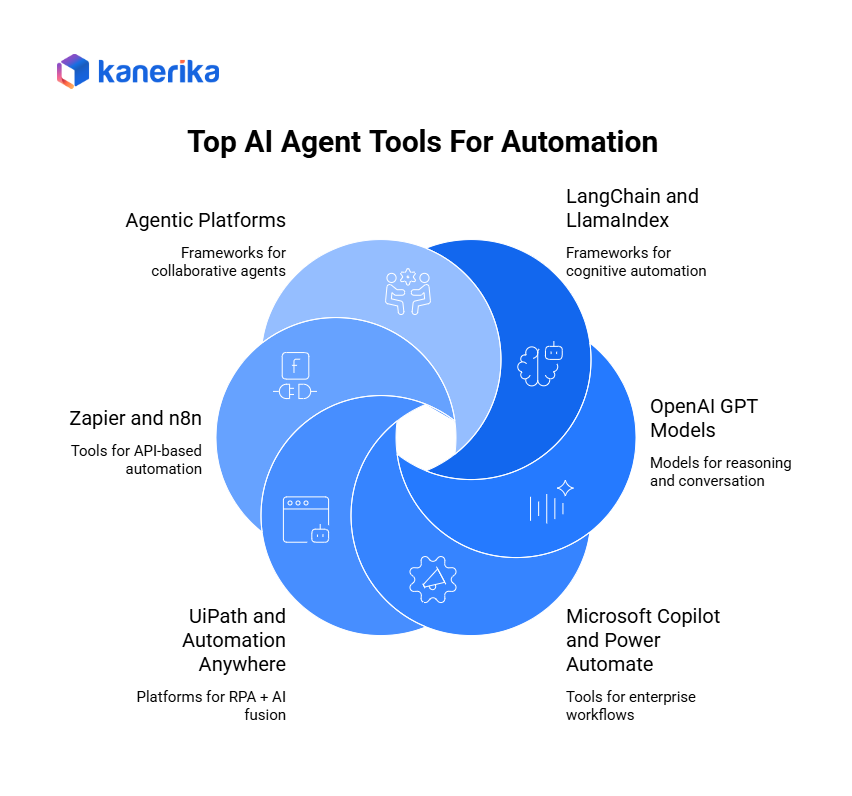Businesses today are entering a transformative phase where AI agents for automation are redefining how work gets done. These intelligent, self-learning systems can think, decide, and act autonomously — enabling enterprises to move beyond repetitive, rule-based processes toward adaptive, data-driven operations.
According to Gartner, by 2026, 40% of large enterprises will deploy autonomous AI agents to manage business processes, underscoring a major shift toward intelligent workflow orchestration.
Unlike traditional automation bots, AI agents bring contextual understanding, reasoning, and continuous learning to enterprise ecosystems. They seamlessly integrate with tools, APIs, and enterprise systems to deliver real-time insights and actions across HR, finance, IT, and customer experience functions.
This blog explores what AI agents are, how they work, their benefits, challenges, and how they’re shaping the next generation of intelligent enterprise automation.
Key Takeaways
- AI agents for automation combine reasoning, memory, and execution capabilities to deliver end-to-end business process automation without human intervention.
- They outperform traditional rule-based bots by being adaptive, context-aware, and capable of continuous learning.
- Core enablers include Large Language Models (LLMs), Robotic Process Automation (RPA) integration, knowledge graphs, and vector databases that enhance contextual understanding and decision accuracy.
- Broad use cases span multiple domains — from customer support and HR onboarding to financial reconciliation, IT operations, and supply chain management.
- AI agents deliver productivity gains, cost reduction, and operational consistency, driving faster decision-making and seamless workflow execution.
- The next evolution will focus on multi-agent collaboration, where specialized agents work together to plan, delegate, and optimize enterprise tasks.
- The future of automation is moving toward fully autonomous enterprises — powered by ethical, transparent, and explainable AI systems that balance intelligence with accountability.
- Businesses embracing AI agents today position themselves for a smarter, scalable, and self-improving future in digital transformation.
Transform Your Business with AI-Powered Solutions!
Partner with Kanerika for Expert AI implementation Services
What Are AI Agents for Automation?
AI agents are autonomous systems designed to perceive their environment, make intelligent decisions, and perform tasks without human intervention. Unlike traditional automation tools that follow fixed rules, AI agents are context-aware, adaptive, and capable of learning from interactions over time. They combine natural language understanding (NLU), reasoning, and planning to interpret user intent, analyze data, and execute complex workflows seamlessly.
The core capabilities of AI agents include:
- Natural Language Understanding (NLU): Interpreting text or speech with human-like comprehension.
- Reasoning and Planning: Making logical decisions based on available information and predefined goals.
- Continuous Learning: Improving performance through feedback and historical patterns.
- Integration with Tools and APIs: Connecting with enterprise systems, CRMs, or cloud platforms to act autonomously.
Traditional automation, such as Robotic Process Automation (RPA), is largely rule-based and static—best suited for repetitive, predictable tasks. In contrast, AI agents are dynamic and intelligent, capable of handling unstructured data, understanding context, and adapting to new scenarios in real time.
For example, an AI agent can manage IT service requests—diagnosing issues, initiating system checks, and resolving tickets automatically—or assist customers by answering queries and processing transactions 24/7. By combining intelligence with action, AI agents are transforming automation from routine execution into autonomous, outcome-driven operations.
How does AI Agents for Automation Work
AI agents operate as intelligent, autonomous systems that combine perception, reasoning, and execution to automate complex business workflows. They mimic human decision-making by understanding data, interpreting intent, and acting through connected enterprise systems — all while continuously learning from feedback.
The workflow of an AI agent typically follows five key stages:
- Perception: The agent gathers input from multiple sources such as emails, chat messages, voice commands, or structured data feeds. This helps it understand the environment and detect triggers for action.
- Reasoning: Using natural language processing and contextual analysis, the agent identifies the intent behind the input and evaluates relevant information.
- Decision: The agent determines the best course of action by applying policies, business rules, or insights gained through machine learning.
- Execution: It performs the chosen task autonomously through system integrations — for example, updating records in Salesforce, creating invoices in SAP, or triggering notifications in Slack.
- Feedback Loop: After execution, the agent analyzes outcomes to refine its performance, ensuring continuous improvement and greater accuracy over time.
The key components enabling this intelligence include:
- Large Language Models (LLMs): Power natural language understanding and reasoning.
- Knowledge Graphs & Vector Databases: Provide contextual memory and relationship-based insights.
- API & RPA Orchestration: Bridge traditional automation tools with modern AI-driven workflows.
- Continuous Learning Systems: Enhance adaptability by learning from user interactions and data feedback.
Example: In HR automation, an AI agent can streamline onboarding by pulling candidate details from emails, scheduling orientation sessions, updating HRMS systems, and notifying managers — all autonomously.
By integrating perception, reasoning, and execution, AI agents transform business operations from manual, rule-based automation to adaptive, self-improving systems that drive efficiency, scalability, and smarter decision-making across the enterprise.

Benefits of Using AI Agents for Automation
Implementing AI agents in business automation delivers measurable gains across productivity, cost efficiency, decision-making, and employee engagement. Additionally, by combining intelligence with autonomy, AI agents go beyond traditional automation, creating scalable and self-improving digital ecosystems.
1. Increased Productivity & Efficiency
AI agents work 24/7, executing repetitive workflows at remarkable speed and consistency. They can handle large-scale data processing, scheduling, and reporting without fatigue or downtime.
Example: Finance teams using AI agents for invoice processing have achieved up to 60% time savings, enabling faster approvals and improved cash flow visibility.
2. Reduced Operational Costs
By minimizing manual intervention, businesses can reduce dependency on human resources for routine tasks. Additionally, AI agents optimize cloud and computing resource utilization, leading to significant cost savings over time.
3. Enhanced Decision-Making
AI agents leverage real-time analytics and historical data to make informed decisions. Whether identifying sales opportunities, predicting maintenance needs, or prioritizing customer tickets, agents act on data-driven insights rather than static rules — ensuring better outcomes.
4. Improved Employee Experience
By automating mundane and repetitive work, AI agents free employees to focus on strategic, creative, and relationship-driven tasks. This not only boosts morale but also improves job satisfaction and innovation across teams.
5. Scalability & Consistency
AI agents can scale operations effortlessly to meet growing workloads without a corresponding increase in costs or management overhead. They deliver consistent performance and compliance, ensuring reliability across global operations.
| Benefit | Description | Example |
| Cost Efficiency | Automates repetitive manual work | HR onboarding automation |
| Speed | Enables real-time decision-making | IT helpdesk ticketing agent |
| Accuracy | Reduces human error and rework | Data entry automation |
| Scalability | Handles growing workloads seamlessly | Customer support AI bots |
| Employee Experience | Frees teams for strategic initiatives | Marketing campaign planning |
By integrating these capabilities, AI agents transform organizations into smarter, faster, and more adaptive enterprises ready for the future of intelligent automation.
AI Agents: A Promising New-Era Finance Solution
Explore how AI agents are transforming finance, offering innovative solutions for smarter decision-making and efficiency.
How to Implement AI Agents for Automation (7‑Step Framework)
1. Define Clear Business Objectives
The foundation of successful AI agent implementation lies in identifying the right use cases. Enterprises should start by defining measurable goals aligned with business priorities such as operational efficiency, customer experience, or cost reduction.
Examples include automating customer queries, streamlining HR processes, or optimizing financial reporting. Prioritize high-volume, repetitive, and decision-intensive workflows where AI agents can deliver tangible ROI quickly. Early success in these areas helps secure organizational buy-in and builds momentum for broader adoption.
2. Assess Data Readiness and Infrastructure
AI agents thrive on data — structured, semi-structured, and unstructured. Before implementation, assess the data quality, accessibility, and governance across departments. Ensure that enterprise systems — such as CRMs, ERPs, and cloud storage — can securely integrate and feed information into the AI agent ecosystem.
Modern data architectures like Microsoft Fabric, Databricks, or Snowflake can serve as centralized hubs for seamless data flow. Additionally, deploy APIs and connectors that allow the agents to interact with external tools like Salesforce, SAP, or ServiceNow without friction.
3. Choose the Right AI Agent Framework
Selecting the right framework or platform is critical for scalability and performance. Popular frameworks such as LangChain, AutoGen, CrewAI, or Microsoft Copilot Studio enable enterprises to build intelligent, modular agents capable of integrating with existing applications.
When evaluating a framework, consider:
- Ease of integration with enterprise systems and APIs.
- Support for natural language understanding (NLU) and reasoning capabilities.
- Security and compliance features (e.g., data encryption, role-based access).
- Customization options for domain-specific requirements.
For enterprise-wide automation, opt for platforms that combine RPA (Robotic Process Automation) with AI-driven reasoning, such as UiPath AI Center or Power Automate with AI Builder.
4. Design Intelligent Workflows
AI agents should not function in isolation. They must operate within a cohesive workflow ecosystem, collaborating with other systems and agents. Map out each process step — from input perception to decision-making and action — ensuring logical handoffs and data validation checkpoints.
For example:
- A customer service agent analyzes emails, classifies intent, and routes them to the right department.
- A finance agent extracts data from invoices, validates details, and triggers payment approvals.
- A supply chain agent monitors stock levels, predicts shortages, and recommends reorder actions.
Integrate feedback loops so the agent can learn continuously from new data and improve performance over time.
5. Implement Governance and Ethical Controls
Enterprise automation with AI agents must adhere to strong governance, transparency, and ethical standards. Define policies for:
- Data privacy and compliance (GDPR, SOC 2, HIPAA, etc.).
- Explainability and auditability of AI decisions.
- Human-in-the-loop mechanisms for critical tasks requiring oversight.
Establish a governance committee to monitor model behavior, accuracy, and bias. Maintain detailed logs of decisions and model updates for accountability and traceability.
6. Upskill Teams and Promote AI Literacy
AI agents are only as effective as the teams managing them. Train employees on AI fundamentals, prompt engineering, and process automation principles. Create multidisciplinary teams that blend business knowledge with technical expertise to ensure smooth adoption.
Encourage collaboration between IT, data science, and business units to maximize value realization. Organizations with strong internal AI literacy experience faster scaling and fewer resistance challenges.
7. Pilot, Measure, and Scale Strategically
Begin with a pilot project to validate technical feasibility, performance, and ROI. Measure outcomes such as process efficiency, cost savings, and error reduction. Gather user feedback to refine workflows and identify areas for improvement.
Once validated, scale the deployment across departments using a modular, phased approach. This ensures controlled expansion while maintaining governance and performance standards. Integrate monitoring dashboards (via Power BI, Tableau, or Grafana) to track KPIs and agent behavior in real time.
Tools to Enable AI Agents for Automation
AI agent tools form the backbone of intelligent business automation, enabling enterprises to design, deploy, and orchestrate autonomous systems that can understand, decide, and act without constant human oversight.
1. LangChain and LlamaIndex (for Cognitive Automation)
LangChain and LlamaIndex are foundational frameworks for building AI agents that leverage large language models. Moreover, They provide modular components for reasoning, memory, and tool use, allowing agents to connect with external data sources, databases, and APIs. LangChain’s “chains” and “agents” enable dynamic decision-making, while LlamaIndex helps retrieve and contextualize enterprise data through vector-based search. Together, they power conversational, context-aware agents capable of executing complex workflows.
2. OpenAI GPT Models (for Reasoning and Conversation)
Also, OpenAI’s GPT-4 and GPT-5 models underpin the natural language understanding and reasoning capabilities of modern AI agents. As well as, these models can interpret complex instructions, summarize data, and make contextual decisions. When integrated into automation platforms, they enable chat-based task execution — such as generating reports, responding to customer queries, or drafting emails automatically.
3. Microsoft Copilot and Power Automate (for Enterprise Workflows)
Microsoft Copilot and Power Automate empower businesses to integrate AI agents directly into everyday productivity tools like Excel, Outlook, and Teams. Power Automate provides low-code workflows that combine RPA with AI, while Copilot introduces generative intelligence to interpret natural language prompts and perform multi-step business tasks. This integration helps employees automate approvals, data entry, and reporting effortlessly.
4. UiPath and Automation Anywhere (for RPA + AI Fusion)
These platforms extend traditional RPA capabilities with AI-powered decision-making. UiPath’s “AI Center” and Automation Anywhere’s “IQ Bot” use machine learning to classify documents, extract data, and make conditional decisions. Moreover, they bridge structured RPA with unstructured AI workflows, allowing agents to handle invoices, compliance checks, and customer requests end-to-end.
5. Zapier and n8n (for API-Based Automation)
For small to mid-scale automation, Zapier and n8n enable AI agents to integrate seamlessly with thousands of SaaS applications. They trigger workflows, synchronize data, and automate repetitive online actions such as CRM updates or marketing campaigns — all without deep coding knowledge.
6. Agentic Platforms (e.g., CrewAI, AutoGen, and ReAct Frameworks)
Next-generation frameworks like CrewAI and AutoGen orchestrate multiple collaborating agents that can plan, communicate, and execute tasks collectively. These frameworks represent the frontier of agentic automation, where agents work as digital teams — brainstorming, delegating, and optimizing outcomes autonomously.

Kanerika’s AI Agents: Transforming Automation with Intelligent Agents
Alan – AI Legal Document Summarizer
Alan transforms lengthy legal documents into concise, actionable summaries, simplifying complex legal processes and saving valuable time.
Key Features
- Customizable Summaries: Users can tailor summaries using simple, natural language commands, focusing on specific sections or clauses.
- Unlimited Summaries: Alan allows for unlimited summary generation, ensuring consistent and efficient results.
Benefits
- Time Efficiency: Drastically reduces the time spent on legal reviews and contract analysis.
- Enhanced Decision-Making: Highlights key legal points, aiding in quicker and more informed decisions.
How It Works
- Upload your legal document (up to 20 pages).
- Define summarization rules using natural language.
- Receive a clear and actionable summary directly in your inbox.
Susan – AI PII Redactor
Susan ensures documents meet data privacy regulations by securely redacting sensitive information, such as personal names, dates, locations, organizations, and numbers.
Key Features
- Comprehensive Redaction: Identifies and redacts various types of Personally Identifiable Information (PII).
- Customizable Fields: Users can specify which PII categories to redact for precision.
Benefits
- Regulatory Compliance: Adheres to global data privacy standards like GDPR, CCPA, and HIPAA.
- Risk Reduction: Minimizes the risk of data breaches by ensuring sensitive information is securely redacted.
How It Works
- Upload your document (up to 20 pages).
- Specify the fields to be redacted.
- Receive a secure, redacted file directly in your inbox.
Mike – AI Quantitative Proofreader
Mike enhances document accuracy by validating numerical data and ensuring consistency across documents.
Key Features
- Arithmetic Verification: Checks for mathematical accuracy in quantitative data.
- Cross-Document Consistency: Ensures data consistency across multiple documents.
Benefits
- Error Reduction: Minimizes manual proofreading efforts and errors.
- Detailed Reporting: Provides comprehensive discrepancy reports for review.
How It Works
- Upload your document(s) (up to 10 pages).
- Mike analyzes and cross-validates numerical data.
- Receive an error report and suggestions for correction.
Kanerika offers basic versions of these AI agents for free, with professional versions available for advanced features at a competitive price point.
Transform Your Business with Cutting-Edge AI Solutions!
Partner with Kanerika for seamless AI integration and expert support.
Top Use Cases of AI Agents for Automation
1. Customer Support Automation
Autonomous agents manage FAQs, complaints, routing & escalation in customer service. For example, Klarna uses an AI-chatbot to handle the equivalent of ~700 full-time staff’s worth of queries.
Also, SmileDirectClub deployed a generative-AI bot that resolves over 50 % of customer interactions automatically.
2. IT & Infrastructure Management
AI agents detect anomalies, fix issues, trigger alerts in real time, and reduce burden on help-desk teams. For example, according to a recent study: 60% of organizations have implemented AI-powered copilots for IT help desks. Also, Uber uses AI agents to summarise communications with users and surface context for customer-service reps.
3. Sales & Marketing Enablement
AI agents optimize lead generation and campaign management by analyzing customer behavior and engagement data. Additionally, they personalize follow-ups, schedule outreach, and score leads intelligently, ensuring higher conversion rates and improved ROI.
4. HR & Recruitment
From resume screening to onboarding, AI agents streamline HR workflows. Also, they can extract candidate data, schedule interviews, and even deliver training recommendations based on employee profiles. This improves hiring speed and enhances candidate experience.
5. Finance & Operations
Agents automate invoice approval, expense audits, compliance checks, etc. For example, C.H. Robinson, the logistics provider had announced performing over 3 million shipping tasks via its fleet of generative AI agents. Also, that covers operational workflows in freight/shipping.
6. Supply Chain Optimization
AI agents forecast demand, manage procurement, handle logistics exceptions. For example, Blue Yonder developed AI agents for supply chain planning & execution, enabling businesses to “see, analyze, decide, and act with machine speed” amid disruptions.

Challenges in Implementing AI Agents for Automation
While AI agents are revolutionizing business automation, organizations often face significant challenges during deployment. These challenges stem from the complexity of integrating intelligent systems into existing infrastructures while maintaining compliance, transparency, and scalability.
1. Data Privacy & Compliance
AI agents frequently process sensitive business and customer data, raising concerns around data protection and regulatory compliance (GDPR, CCPA, etc.). Consequently, improper handling or storage can lead to breaches and legal penalties. As well as, ensuring encryption, access control, and secure data pipelines is essential to safeguard information integrity.
2. Explainability & Trust
AI-driven decisions are only effective when they can be explained and audited. Black-box models reduce user trust and may violate compliance requirements in regulated industries. Moreover, implementing model interpretability frameworks and maintaining decision logs are critical to ensure transparency.
3. Integration Complexity
Seamless interoperability with existing enterprise systems is one of the biggest hurdles. AI agents must connect with CRMs, ERPs, and APIs while managing data across cloud and on-prem environments. Poor integration can slow adoption and limit automation outcomes.
4. Skill Gap
Developing, deploying, and monitoring AI agents requires technical expertise in AI, data science, and system orchestration. Moreover, many teams lack the necessary AI literacy, making training and cross-functional collaboration essential for successful implementation.
5. Cost of Implementation
AI agent projects often require substantial upfront investment in cloud infrastructure, model training, and integration tools. While ROI is significant long term, managing costs through phased implementation and leveraging pre-trained models helps optimize budgets.
| Challenge | Impact | Mitigation |
| Data Privacy | Risk of data breaches | Encryption, RBAC, and compliance audits |
| Explainability | Compliance issues, low trust | Use model interpretability tools |
| Integration | Slow or failed adoption | Standardized APIs and prebuilt connectors |
| Skill Gap | Poor model performance | Employee upskilling & AI training |
| Cost | High initial investment | Phased rollout & cloud optimization |
Future of AI Agents for Automation
The future of business automation lies in the evolution of autonomous enterprises, where AI agents manage complete workflows without human intervention. These intelligent systems will not only execute routine tasks but also make strategic decisions, adapt to dynamic environments, and collaborate across functions.
A major trend shaping this transformation is the convergence of RPA, AI, and multi-agent systems. Instead of isolated bots, organizations will deploy interconnected AI agents that specialize in different areas—finance, HR, IT, or operations—and communicate with each other to optimize performance and decision-making.
The integration of Generative AI will further enhance agent capabilities, enabling them to draft reports, generate insights, create content, and even write code autonomously. This shift from reactive automation to proactive intelligence will redefine how enterprises operate, innovate, and scale.
According to McKinsey (2024), “By 2030, 60% of enterprise workflows will be managed by autonomous AI agents.” This projection underscores a fundamental shift toward machine-driven operational excellence.
The long-term vision for AI automation is a gradual evolution — from task automation (repetitive, rule-based work) to process automation (end-to-end workflows), and ultimately to autonomous decision-making ecosystems, where AI agents continuously learn, collaborate, and self-optimize.
Hyperautomation Trends Guide 2024: Everything you need to know
Elevate enterprise performance through intelligent, comprehensive automation technologies and strategic digital transformation.
Kanerika’s AI Solutions: Powering AI Agents for Automation
Kanerika is a top-rated AI implementation company specializing in Agentic Automation and AI-driven solutions tailored to unique business needs. With deep expertise in AI, we empower industries like banking, finance, retail, manufacturing, healthcare, and logistics to seamlessly integrate intelligent automation into their operations. Our self-governing AI agents take automation beyond traditional rule-based systems, enabling businesses to enhance efficiency, reduce costs, and make autonomous, data-driven decisions.
By developing advanced industry-specific AI models, we help businesses automate complex workflows, optimize real-time decision-making, and gain a competitive edge. Whether it’s financial forecasting, intelligent customer engagement, supply chain optimization, or AI-driven patient care, Kanerika’s AI solutions adapt to diverse operational challenges. Our AI agents, including those for legal document summarization, PII redaction, and quantitative proofreading, are just the beginning—we are continuously developing more AI-powered agents to automate critical processes across industries.
As a trusted leader in AI and Agentic Automation, Kanerika is committed to delivering scalable, intelligent automation that drives measurable improvements. Our AI solutions don’t just streamline operations—they redefine business efficiency with autonomous AI agents that learn, adapt, and act independently to unlock new possibilities in digital transformation.
Drive Business Growth and Efficiency with AI Agents for Automation!
Partner with Kanerika for Expert AI implementation Services
FAQs
1. What are AI agents for automation?
AI agents are intelligent systems that can perceive data, reason, and take actions autonomously to execute business processes without constant human input.
2. How are AI agents different from traditional RPA bots?
Unlike RPA bots that follow fixed rules, AI agents are context-aware and adaptive — they learn from data, handle exceptions, and make independent decisions.
3. What business functions can AI agents automate?
They can streamline customer support, HR onboarding, finance operations, IT management, and supply chain coordination through intelligent workflow execution.
4. What technologies power AI agents?
Core technologies include Large Language Models (LLMs), knowledge graphs, vector databases, APIs, and RPA orchestration frameworks.
5. Are AI agents secure and compliant?
Yes — with proper governance, encryption, and access control, AI agents can safely handle sensitive data and maintain compliance with GDPR/CCPA.
6. What is the future of AI agents in automation?
By 2030, most enterprises will adopt multi-agent systems that collaborate autonomously, driving fully adaptive and intelligent business ecosystems.










